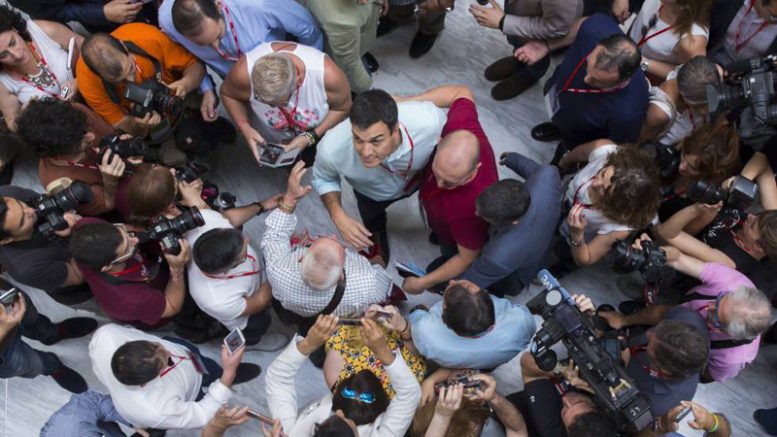• Socialists embrace ‘plurinational’ nature of Spain in party’s new platform
• PP, Ciudadanos roundly criticize move as ‘radical’ leftward shift in PSOE policy
Incorporation of the concept of plurinacionalidad (“plurinationalism”) into the platform of Spain’s Socialist party (PSOE) during its 39th party conference last weekend has ended years of political fence-sitting by the PSOE on the issue of how to address the obvious differences of cultural and political identity among regions within Spain.
It has also fast-tracked the issue into the centre of political debate in Spain at a time of heightened tension over the announcement by regional government authorities in Catalonia hat they will move forward unilaterally with an independence referendum for the region after a breakdown of their discussions with the central government in Madrid aimed at securing a mutually agreed referendum, which is prohibited in Spain by the national Constitution of 1978.
During last weekend’s Socialist conclave, the party introduced language into the its policy platform that for the first time in its history recognized the plurinationalism of the Spanish state, with delegates to the conference voting overwhelmingly to support the language.
On Monday, the PSOE was criticized from the political right, with a spokesman for the conservative governing Partido Popular (PP) criticising the Socialists’ endorsement of plurinationalism for Spain as a “radical” shift to the left and inopportune, considering the government’s current conundrum over the Catalan referendum issue. Albert Rivera, leader of the centre-right Ciudadanos party, likewise criticized the Socialists’ move as abetting a leftwing strategy led by Podemos and regional secessionist parties that could only end in the “demolition” of Spain as a sovereign nation.
Prior to the Socialists conference, the concept was previously only hinted at in the Socialists Declaracion de Granada of July 2013 but never fully embraced. When plurinacionalidad became a rallying cry and campaign differentiator of the Socialists’ rival Podemos (We Can) during national elections in 2015-16, then-PSOE secretary general and candidate Pedro Sanchez was unable to embrace the concept due to internal opposition of powerful Socialist party leaders in regions such as Andalucia, Extremadura and Aragon.
Following an internal leadership coup that ousted Sánchez from power last October, he said in a nationally televised interview that he personally favoured recognising the plurinational nature of Spain and then made that position part of the campaign that returned him to the party’s top leadership post in elections last month.
That victory represented a resounding defeat for the regional presidents and powerbrokers opposing plurinationalism who had lined up in support of rival Susana Díaz, regional president of Andalucia, leaving the way open for incorporation of the plurinational language in the PSOE platform at the party conference.


